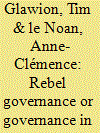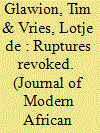| Srl | Item |
| 1 |
ID:
189349


|
|
|
|
|
| Summary/Abstract |
Rebel governance assumes a symbiotic relationship between coercion and public goods provision. However, in the rebel-held town of Ndélé, Central African Republic, we find that governance happens in rebel-held territory, but rarely by rebels. Rebels allowed other actors to provide services for the people only when this did not hinder rebels extracting political clout and economic benefit from the people and their lands. We show how rebels’ extractive ambitions and governance discourses evolved during successive stages of rebellion through a diachronic comparison rooted in multimethod fieldwork from 2018 to 2022. We ask, why were rebel groups able to set up their rule, then rule for seven years, before ultimately losing power? Rebels evoked public goods at the onset of rebellion to justify the use of coercive means. After rebel rule was established, rebels outsourced public goods to international and state actors allowing for governance in rebel-held territory while focussing their own efforts on extraction. When their rule was challenged, rebels targeted governance actors and spaces in their territory in pursuit of economic gain and political dominance. Our findings call for a re-evaluation of existing rebel governance studies and the ways in which rebel groups are engaged with.
|
|
|
|
|
|
|
|
|
|
|
|
|
|
|
|
| 2 |
ID:
160680


|
|
|
|
|
| Summary/Abstract |
The Central African Republic experienced unprecedented violence between 2012 and 2014. We analyse three recent ruptures that developed as a result of this crisis, suggesting a break with the country's past. First, the Séléka rebellion that started in 2012; second, the establishment of a robust UN Peacekeeping mission in 2014; and finally, the democratic election of a civilian president in 2016. However, three deep-rooted patterns of governance have in each case transformed these ruptures. A history of outsourced politics, a plurality of violence and peripheral neglect push actors to perpetuate the violent past rather than breaking with it. We conclude that after an initial attempt to break with the CAR's long-term political economic trends, rebel groups, the UN mission and the democratic government have backtracked and now risk reinforcing the violence that mark politics and everyday life in the country.
|
|
|
|
|
|
|
|
|
|
|
|
|
|
|
|